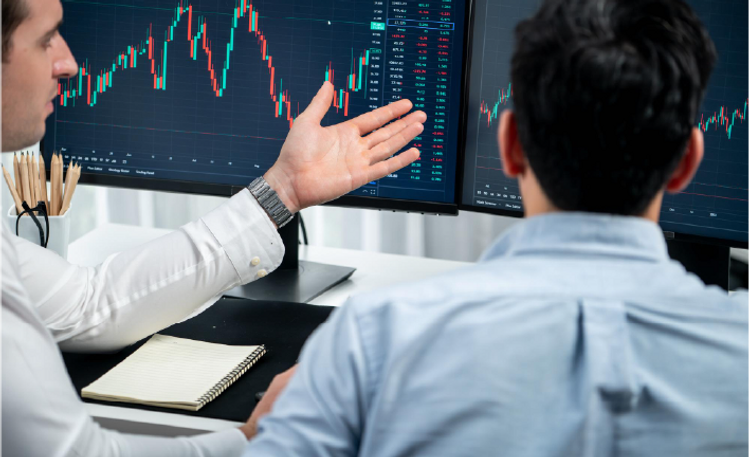
Education
Introduction to Forex Trading
and Forex Markets
What is Forex?
Forex, short for foreign exchange, is the world’s largest financial market where currencies are bought and sold.
Unlike stock markets that focus on company shares, Forex deals with national currencies — such as the US dollar (USD), Euro (EUR), or Japanese yen (JPY).
At its core, Forex reflects one simple concept: every currency has value relative to another currency. When you exchange money for a trip abroad, you’re already participating in the Forex market.

Why is Forex Important?
Forex underpins global trade and finance.
Corporations, governments, and individuals all need to convert currencies:
Businesses convert currencies to pay suppliers or receive payments abroad.
Investors move money between countries to capture higher returns
Central banks intervene to stabilize economies or influence exchange rates.
This constant flow of money creates a $7+ trillion-a-day market,
making Forex the most liquid market in the world.
How Does Forex Trading Work?
Forex is traded in pairs.
Each trade involves simultaneously buying one currency and selling another.
EXAMPLE
EUR/USD = 1.10
Means 1 Euro is worth 1.10 US dollars.
If you believe the Euro will strengthen against the Dollar, you buy EUR/USD.
If you expect the Euro to weaken, you sell EUR/USD.

Who Trades Forex?
Banks & Financial Institutions
the biggest players,
moving billions daily.
Governments & Central Banks
stabilizing exchange rates
and economies.
Corporations
hedging to manage currency
risk in global operations.
Retail Traders
individuals like you and me,
trading online through brokers.
Key Features of the Forex Market
24 Hours a Day
Forex operates Monday to Friday, across global financial hubs (London, New York, Tokyo, Sydney).
Leverage
Traders can control large positions with relatively small capital (e.g., 1:100 leverage), though this also magnifies risks.
High Liquidity
Large volume ensures quick execution with minimal slippage for major currencies.
Diverse Instruments
Beyond major pairs, traders can explore minors, exotics, and commodities priced in currencies.
The Major Currency Pairs
Some currencies dominate trading.
The most common pairs include:
● EUR/USD – Euro vs US Dollar (most traded)
● USD/JPY – US Dollar vs Japanese Yen
● GBP/USD – British Pound vs US Dollar
● USD/CHF – US Dollar vs Swiss Franc
● AUD/USD – Australian Dollar vs US Dollar
● USD/CAD – US Dollar vs Canadian Dollar
These “majors” are known for tight spreads and deep liquidity.

Why Do Currency Prices Move?
Currencies fluctuate based on a mix of:
-
Economic data
(GDP growth, inflation, employment)
-
Interest Rates
(higher rates attract more investors, strengthening a currency)
-
Political Events
(elections, conflicts, policy changes)
-
Market Sentiment
(risk appetite or fear)
This interplay creates constant opportunities — but also risks.
Benefits of
Forex Trading?
Accessibility
Low minimum capital requirements via online brokers.
Flexibility
Trade anytime across time zones
Liquidity
Easier to enter and exit positions.
Opportunity in Both Directions
Profit potential whether a currency strengthens or weakens.
Risks of Forex Trading
Leverage Risk
Small price moves can
cause large gains or losses.
Psychological Pressure
Emotional trading often
leads to mistakes.
Market Volatility
Sudden spikes from
news or events.
Broker Risk
Choosing unreliable brokers
can expose traders to fraud.
Understanding risk management (stop-loss orders, position sizing,
diversification) is essential for long-term success.
Getting Started
Learn the Basics
Understand pairs, pips, spreads, and lot sizes.
Choose a Reliable Broker
Look for regulation, fair fees, and user-friendly platforms.
Start with a Demo Account
Practice with virtual money before risking real capital.
Develop a Strategy
Combine technical analysis (charts) and fundamental analysis (news, economics).
Manage Risks
Never trade without stop-losses or risk more than you can afford to lose.
Final Thoughts
The Forex market is vast, dynamic, and full of opportunity. Its global nature, liquidity, and accessibility make it appealing to beginners and professionals alike. But success requires more than luck — it takes knowledge, discipline, and risk management.
As a trader, your first step is education. The more you understand about the forces shaping currency markets, the better prepared you’ll be to navigate them.
